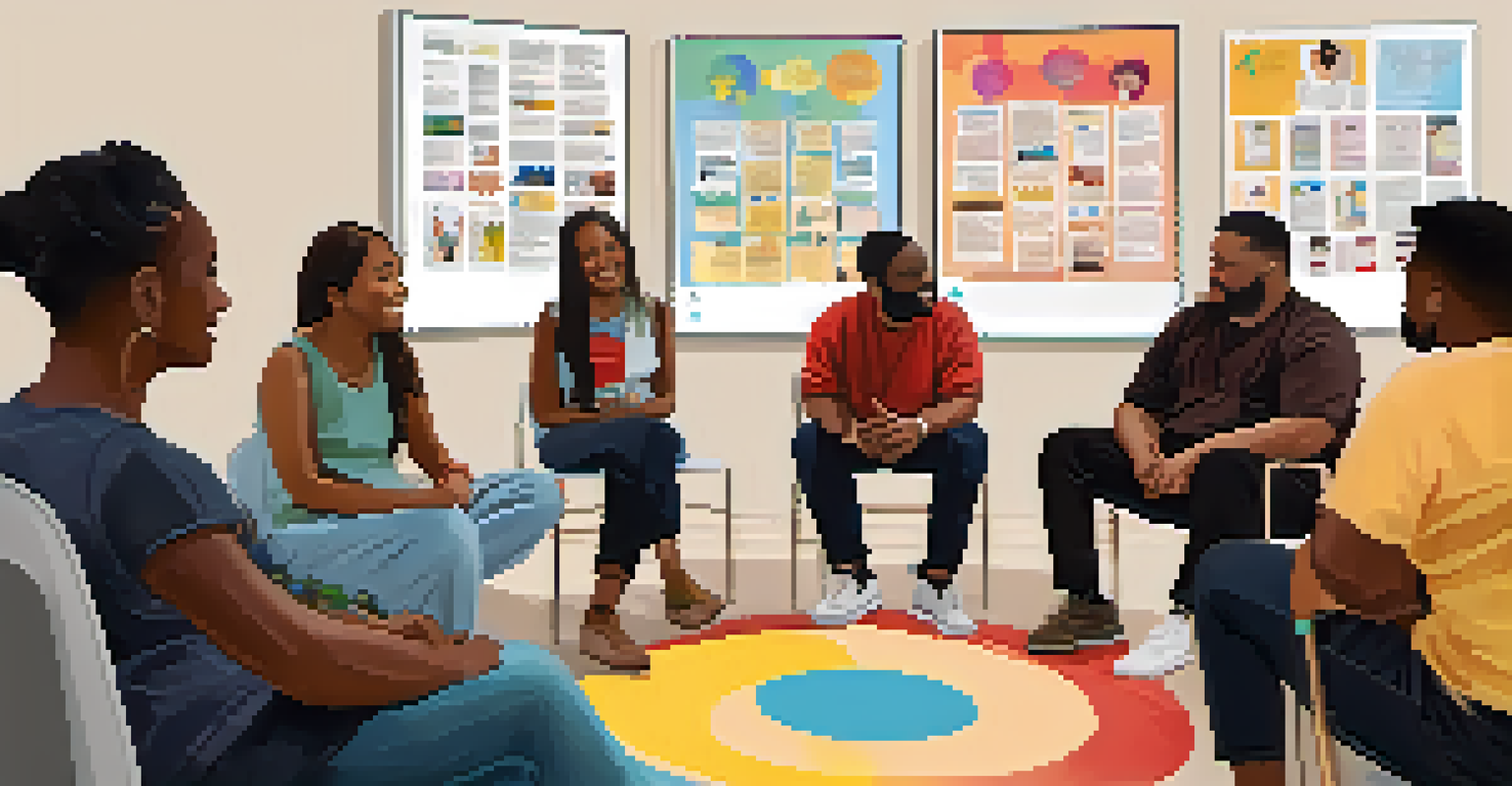Cultural Competence in LA Mental Health Resources

Understanding Cultural Competence in Mental Health
Cultural competence refers to the ability of mental health professionals to understand, communicate with, and effectively interact with individuals from diverse cultural backgrounds. It goes beyond mere awareness of cultural differences; it involves actively integrating cultural knowledge into practice. This understanding is crucial in a multicultural city like Los Angeles, where diverse communities bring unique values, beliefs, and experiences that can influence mental health.
Cultural competence is not a goal, but a continuous journey of understanding, learning, and connection.
When therapists and counselors possess cultural competence, they can build stronger therapeutic relationships with their clients. This connection fosters trust, making clients feel valued and understood. For instance, a therapist who understands the cultural significance of family in Hispanic communities may approach therapy differently, emphasizing family involvement in treatment plans.
Ultimately, cultural competence not only enhances the therapeutic experience but also improves treatment outcomes. Clients are more likely to engage in therapy, adhere to treatment plans, and report satisfaction with their care when they feel their cultural identity is recognized and respected.
The Diversity of Los Angeles Communities
Los Angeles is one of the most culturally diverse cities in the world, home to a mosaic of ethnicities, languages, and traditions. This diversity presents both opportunities and challenges for mental health professionals. Understanding the unique cultural backgrounds of clients—from Latino and Asian American to African American and LGBTQ+ populations—can be essential for effective treatment.

Each community in LA has its own set of values, beliefs, and stigma surrounding mental health. For example, in some cultures, mental health issues may be seen as a personal weakness or a source of shame, leading to reluctance in seeking help. By recognizing these cultural nuances, therapists can tailor their approach to better resonate with their clients.
Cultural Competence Enhances Care
Understanding and integrating cultural knowledge into mental health practices can significantly improve client engagement and treatment outcomes.
Moreover, language barriers can further complicate access to mental health resources. Providing services that are linguistically and culturally appropriate can make a significant difference in ensuring that all individuals feel comfortable and supported when seeking help.
Barriers to Seeking Mental Health Care
Despite the availability of mental health resources in LA, many individuals face barriers to accessing care. These barriers can be cultural, economic, or systemic. For instance, some communities may lack awareness of available services or may have distrust in mental health professionals due to past negative experiences.
The greatest gift you can give someone is your own personal development. I used to say, 'If you will help me, I will help you.' Now I say, 'If you will help yourself, I will help you.'
Economic factors also play a significant role. High costs and lack of insurance can prevent individuals from seeking necessary help, leaving many without support. This is particularly concerning in low-income neighborhoods, where mental health resources may be scarce.
To effectively address these barriers, mental health agencies in Los Angeles must prioritize outreach and education within communities. By providing information in a culturally sensitive manner, they can empower individuals to seek the help they need.
The Role of Community-Based Organizations
Community-based organizations (CBOs) play a vital role in promoting cultural competence within mental health resources. These organizations often have deep ties to local communities, allowing them to understand the specific needs and concerns of their populations. By collaborating with CBOs, mental health providers can bridge the gap between services and the communities they serve.
CBOs typically offer culturally tailored programs that resonate with their audiences. For instance, they may host workshops or support groups that incorporate cultural traditions and practices, making mental health resources more accessible. This grassroots approach helps build trust and encourages individuals to seek help.
Diverse Communities Require Tailored Approaches
Los Angeles' varied cultural backgrounds necessitate customized mental health strategies to address unique values, beliefs, and stigma surrounding mental health.
Additionally, these organizations can be instrumental in training mental health professionals about cultural nuances, ensuring providers are well-equipped to handle diverse clients. This collaboration ultimately enhances the overall effectiveness of mental health services in LA.
Training Mental Health Professionals in Cultural Competence
To improve cultural competence in mental health care, training programs for professionals are essential. These programs should focus on understanding diverse cultural perspectives and the impact of systemic issues on mental health. Training can include workshops, seminars, and even supervised clinical experiences with diverse populations.
One effective approach is incorporating real-life scenarios and case studies into training. For example, role-playing exercises can help therapists practice interactive skills, enabling them to respond appropriately to clients from different backgrounds. This hands-on experience is invaluable in fostering genuine understanding and empathy.
Moreover, continuous education is crucial. The landscape of culture is constantly evolving, and mental health professionals must stay informed about emerging trends and challenges within various communities. By committing to ongoing learning, therapists can ensure they remain culturally competent throughout their careers.
The Impact of Cultural Competence on Treatment Outcomes
Research shows that cultural competence significantly improves treatment outcomes in mental health. When clients feel understood and respected, they are more likely to engage fully in the therapeutic process. This leads to better adherence to treatment plans and increased satisfaction with care.
For instance, a culturally competent therapist may incorporate a client's cultural practices into their treatment plan, making it more relevant and acceptable. This personalized approach not only helps clients feel more comfortable but also empowers them to take an active role in their mental health journey.
Community Organizations Bridge Gaps
Community-based organizations play a crucial role in promoting cultural competence and making mental health resources more accessible to diverse populations.
In contrast, a lack of cultural competence can lead to misdiagnosis, misunderstanding, and even harm. It’s crucial for mental health systems to recognize the importance of cultural factors in treatment to ensure that all clients receive effective and compassionate care.
Moving Towards a Culturally Competent Future
As Los Angeles continues to grow and evolve, so too must its mental health resources. The journey toward cultural competence is ongoing and requires a collective effort from mental health professionals, community organizations, and policymakers. Together, they can create a more inclusive environment that promotes mental well-being for all.
Advocacy for policy changes that prioritize cultural competence in mental health services is essential. This can include funding for community outreach programs, training initiatives, and resources specifically aimed at underserved populations. By addressing these systemic issues, we can pave the way for a brighter future.

Moreover, fostering open dialogues around mental health and cultural competence can encourage individuals to seek help without fear of stigma. By normalizing conversations about mental health, we can create a supportive community that values and respects diversity, ultimately leading to improved mental health outcomes across Los Angeles.